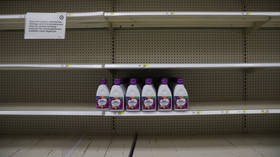It will take systemic change to fix the deep-seated roots of the current crisis
Dakotah Lilly is an independent political scientist and analyst. His work has featured in publications such as MintPress, OrinocoTribune, and Popular Resistance. His areas of specialty include political economics, left populism, Venezuela, and socialism of the 21st century.
@GringoChavistaDakotahLilly.com

Similac baby formulas are seen at empty baby formula section shelves at a Target store due to shortage in the availability of baby food on May 17, 2022, in New Jersey, United States.
© Tayfun Coskun / Anadolu Agency via Getty Images
If you or somebody you know has had the blessing (or curse, depending on who you ask) of becoming a parent in the US recently, then you likely know about the crisis-level lack of baby formula on American shelves. The most recent estimates of the out-of-stock rate for baby formula is 43%, according to Datasembly, at the same time that working people in the United States continue to scramble to fight back against historic increases in prices throughout the consumer market.
How did we get here? If you listen to mainstream economists, politicians or corporations, the answer is complicated and usually involves a mixture of vague “supply-chain issues” caused by Covid-19, as well as the blame being somehow placed in part on the conflict in Ukraine. This is nonsense, and luckily the majority of Americans seem to understand that the establishment has once again left them out in the rain to dry.
The tale of the problem facing millions of working families and parents across the country exposes just how sick our economic system is. Abbott Laboratories is the producer of 43% of all baby formula found in the United States, according to a USDA report from 2011. A handful of other companies make up the other 57%, one of them being Nestle with its notorious history of misconduct.
If you or somebody you know has had the blessing (or curse, depending on who you ask) of becoming a parent in the US recently, then you likely know about the crisis-level lack of baby formula on American shelves. The most recent estimates of the out-of-stock rate for baby formula is 43%, according to Datasembly, at the same time that working people in the United States continue to scramble to fight back against historic increases in prices throughout the consumer market.
How did we get here? If you listen to mainstream economists, politicians or corporations, the answer is complicated and usually involves a mixture of vague “supply-chain issues” caused by Covid-19, as well as the blame being somehow placed in part on the conflict in Ukraine. This is nonsense, and luckily the majority of Americans seem to understand that the establishment has once again left them out in the rain to dry.
The tale of the problem facing millions of working families and parents across the country exposes just how sick our economic system is. Abbott Laboratories is the producer of 43% of all baby formula found in the United States, according to a USDA report from 2011. A handful of other companies make up the other 57%, one of them being Nestle with its notorious history of misconduct.
Abbott Nutrition is also the exclusive supplier for the majority of state Women, Infants and Children agencies, and over 1.2 million infants served by WIC are limited to specific brands of “contract formula.” This is important because in February, parents reported multiple instances of children becoming ill and two cases of infant death after consuming products made at an Abbott plant in Michigan.
However, the FDA was made aware of multiple crimes and shady health practices as early as October 2021, when a whistleblower report reached their desks. The FDA did not inspect the plant until January 31, 2022, and the recall was not issued until February 17, 2022. The company, of course, promised to investigate itself, but a spokesperson has already said the formula from the facility in question “is not likely the source of infection in the reported cases” and “there was not an outbreak caused by products from the facility.” The FDA, however, found that many health regulations were violated and that harmful bacteria was present within the production line of baby formula.
Between these findings and the extremely questionable practices laid out in the whistleblower report, why did it take the FDA so long to respond? Why are no charges being filed? Why is nobody being held responsible? It is because we have a government and a corporate world that share one bed and one bank account and work closely together to ensure that regular people continue to be crushed and squeezed as long as their profits are maintained. The plant in Michigan remains closed, and when such large concentration in crucial markets like baby formula is permitted, a plant closure and coordinated corner-cutting (as outlined in the whistleblower report) undoubtedly begins to affect the lives of millions of parents and families. Not only this, but because there really is no way to expand the baby formula market besides more babies being born, there is no incentive in a profit-driven economic system for there to be a surplus storage of formula in case of a time of shortage. The same can be said of the lack of certain health products like sanitizers and masks in the wake of the Covid outbreak.
So what has the US government decided to do to tame these shortages and provide relief to parents? With its infinite budget to send troops to Somalia, bail out the rich and powerful, and provide weaponry to Ukraine, surely there is something the government could do. So far, however, it has continued its century-long policy of doing nothing to help working people. What SHOULD the government do? First, people at Abbott and the FDA should be held accountable like any other person, given that their negligence has resulted in deaths and shortages while Abbott continues to reap billions in profits. From December 2021 to March 2022, Abbott’s revenues increased by 13.76%, while the company has also spent billions of dollars on stock buybacks instead of fixing their facilities.

Read more US faces baby formula shortage
Abbott and other formula makers have gotten away with predatory practices for years, so finally holding them accountable should be the very start of the conversation. Ultimately, though, nationalization could be the answer. If Abbott’s assets and production facilities were to be nationalized, they could run in the interest of society, communities, and families instead of as a way for a select group of elites to live lives of luxury at the expense of the rest of us. The state could take a leading role in producing baby formula at a much lower cost because of the lack of advertising and administrative costs that privatized firms encounter. The workers of Abbott should also be offered a seat at the table in terms of policy, production, planning, and the usual running of operations. The goal should be for the state to take on a teaching and leading role until the workers are better equipped and prepared to run things themselves. This would also have a positive effect on record-breaking inflation as this state-owned enterprise could then push their more affordable products as reference prices for similar products.
The Biden administration has already recognized the failure of the so-called free market by invoking the Defense Production Act of 1950, which grants the federal government broad powers over the economy in times of distress and in response to issues pertaining to national defense or the economic security of Americans. The act will be used to require manufacturers to first complete orders related to formula ingredients before any other order. This is a step in the right direction, but why did it take this long and why don’t we apply this logic to every other instance where neoliberalism, capitalism, and orthodox economics fails to provide for the people? Some commentators even have the audacity to attack this move as infringing on the “rights of private property” and for giving the federal government more power. We need a government willing to fight on behalf of We the People, against established economic power and oligarchs who continue to win their fights at the expense of everyday people. A government of this type won’t be led by Biden or Trump, or any other Democrat or Republican, but instead by We the People.
The statements, views and opinions expressed in this column are solely those of the author and do not necessarily represent those of RT.
No comments:
Post a Comment